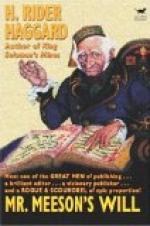Down went the books with a crash and a bang, and, carried away by their weight, down went Mr. Addison on to his nose among them—a contingency that Fiddlestick, Q.C., by-the-way, had not foreseen, for he had overlooked the fact of his client’s vicinity.
The Judge made an awful face, and then, realising the ludicrous nature of the scene, his features relaxed into a smile. But Mr. Addison did not smile. He bounded up off the floor, books slipping off his back in every direction, and, holding his nose (which was injured) with one hand, came skipping right at his learned adviser.
“You did it on purpose!” he almost shouted, quite forgetting where he was; “just let me get at him, I’ll have his wig off!” and then, without waiting for any more, the entire audience burst out into a roar of laughter, which, however, unseemly, was perfectly reasonable; during which Mr. Fiddlestick could be seen apologising in dumb show, with a bland smile upon his countenance, while Mr. News and Mr. Roscoe between them dragged the outraged Addison to his seat, and proffered him handkerchiefs to wipe his bleeding nose.
James saw the whole thing, and forgetting his position, laughed too; and, for some mysterious reason, with the laugh his nervousness passed away.
The usher shouted “Silence!” with tremendous energy, and before the sound had died away James was addressing the Court in a clear and vigorous voice, conscious that he was a thorough master of his case, and the words to state it in would not fail him. Fiddlestick, Q.C., had saved him!
“May it please your Lordship,” he began, “the details of this case are of as remarkable an order as any that to my knowledge have been brought before the Court. The plaintiff, Eustace Meeson, is the sole next-of-kin of Jonathan Meeson, Esquire, the late head of the well known Birmingham publishing firm of Meeson, Addison, and Roscoe. Under a will, bearing date the 8th of May, 1880, the plaintiff was left sole heir to the great wealth of his uncle—that is, with the exception of some legacies. Under a second will, now relied on by the defendants, and dated the 10th November, 1885, the plaintiff was entirely disinherited, and the present defendants, together with some six or eight legatees, were constituted the sole beneficiaries. On or about the 22nd December, 1885, however, the testator executed a third testamentary




